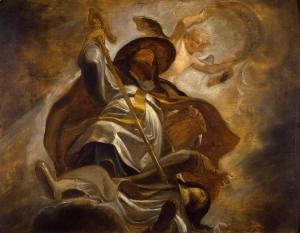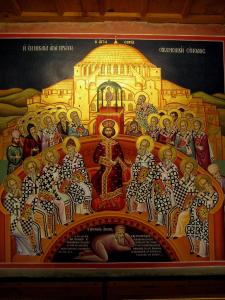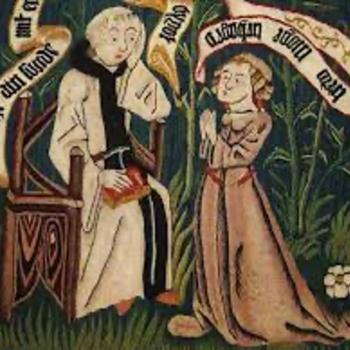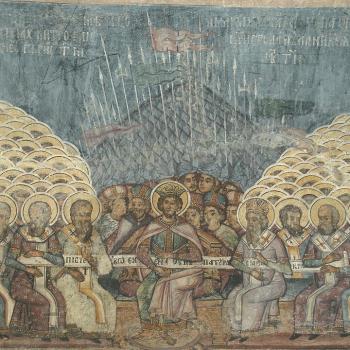This post is part of a series at the Anxious Bench on ‘Contested Ideas in the History of Ideas’, which brings debates from contributors’ respective fields to the fore. Look for more posts in the series throughout the month of October.
If you know anything about early church theology, you have probably heard of the arch-heretic: Arius of Alexandria. His theology claims that the Son of God is less divine than the Father, in particular that the Son was of a distinct substance from the Father; that Arius believed “there was a time when the Son was not.” The story goes that this Arian heresy spread like wildfire throughout the ancient world, despite the Nicene Creed, and took a hold of the Roman Empire. So Jerome mourns the victory of the ‘Arians’ at the council at Sirmium (357): “The whole world groaned, and was astonished to find itself Arian” (Jerome, The Dialogue Against the Luciferians, 19). Fortunately, there is a hero of this story—Athanasius of Alexandria—who fights this fire from the desert with his orthodox pen and his pious spirit. Or, at least, this is often the story told in basic introductions to Trinitarian doctrine in systematic theology, debates in church history, or even in popular discussions over Wayne Grudem and his theology.

The problem with this story? It isn’t true, at least not all the way through.
Marketing or Unmasking Heresy?
Now, let me nuance this provocative statement: Arius was a real person with real ideas who was embroiled in a controversy about the Son of God. It even appears that the theological statements about the divinity of the Son (listed above) are indicative of his conceptions of the triune God. Further, this controversy was so intense that is spread throughout the Roman Empire and prompted dozens of councils in the years between the councils at Nicaea (325) and Constantinople (381). So far so good. Where this story breaks down is when ‘Arian’ theology is seen as a widespread movement of Arian ideas.
During what some have deemed the ‘shadowy years’, a time of confusion and debate after the council of Nicaea, many theological positions were challenged, refined, and reconsidered. If you take a peak into any survey of this period (See: Hanson, Behr, Ayers, Anatolios), it becomes immediately apparent that there are a host of nuanced views by various theological parties and positions. In fact, there doesn’t appear to be any single ‘Arian’ theology which pervades the Roman empire, but a plurality of views with varying degrees of similarity to Arius’ original conceptions. So why do we only talk about a monolithic entity, the ‘Arians’? Well, the hero of our story, Athanasius, is not only gifted in theological reflection, but in marketing.
Athanasius of Alexandria was the chief opponent of Arius and his immediate followers—amidst this debate, he was exiled 5 times and wrote numerous treatises against the so called ‘Ariomaniacs’, his pejorative term for perpetrators of this theological madness. But, importantly, as David Gwynn has persuasively argued, Athanasius wrote himself into a narrative where his theological position was the sole orthodox one in an Arian world. In other words, his narrative was extremely selective and shaped to sell us a story (as all polemics do). This narrative flattened other theological systems that would distinguish themselves from Arius’ own formulations into ‘Arianism’.
Which brings us to several of the most striking aspects of so-called ‘arianism’. First, we do not know what Arius believed about most theological matters. We only have three small works from his own hand—a confession of faith, a letter, and a confession to the Emperor—and they are not completely preserved (see Rowan William’s work for reconstruction and analysis). Most of our knowledge of his thought comes through his enemies, which is not always known for being a reliable witness, though that does not mean we have to throw it all out.
Second, next to no one considered themselves to be followers of Arius, whether because of contextual concerns or theological differences. In the First Creed of the Council of Antioch (written in 341), the bishops claim: “We are not the followers of Arius—for how could we who are bishops follow a presbyter?”. Very few wanted to identify Arius as their leader, even if they were willing to allow him into communion (see: Hanson, Search for the Christian Doctrine of God, 123-8). In other words, the title ‘Arian’ was a polemical tool that was attributed to people who contested identification or association with its namesake. As Lewis Ayers writes, “this controversy is mistakenly called Arian” (Ayers, Nicaea and Its Legacy, 12.)

Labelling the Other
As this Athanasian polemic began, the term was meant to condemn and flatten an umbrella theological position, which might be called ‘subordinationism’. And I should clarify that under whatever name, the types of subordinationism espoused in this period—however distinct from Arianism—are not what should be taught or believed by the church. That is to say, I agree with Athanasius’ theology on these matters more than Eusebius of Caesarea’s or Cyril of Jerusalem’s. But historically, when this polemic started to pick up speed, another strange thing happened: it became untethered from theological positions.
Take Gregory of Nyssa’s Anti-Apollinarian works, for instance. In this, Gregory sought to subvert the heresy of Apollinarius through a point-by-point refutation of his work. At several different points, he blatantly accuses Apollinarius of Arian teaching, or at least that his system is the same. What is the issue with this? Apollinarius wrote a work directly refuting Arian theology—he agreed with the creed of Nicaea over matters of the Trinity! And from this point the term ‘Arian’ doesn’t have to hold any theological content to be effective—it became a means to alienate, other, and condemn.
So, what is the contested idea, for scholars of the early church? First, whether there is truly an ‘Arian’ theology that we can recover (i.e. the theology of the presbyter, Arius). Second, and of great relevance for the church, is whether we should use the term ‘Arian’ at all since it is plagued with such a pejorative meaning.
Arians, Snowflakes, and Alt-right Trolls
For the purposes of this post, I will just discuss the latter contested idea, as I think it bears greater relevance for the church today. I must admit that I am torn on the issue. In my own writing, I try to avoid using the term ‘Arian’ for anyone other than Arius and his immediate followers, because I have seen how this has led to uncritical villainization of figures in the fourth century. In my mind, if we claim someone is an ‘Arian’ we need to make sure that this means ‘espouses the theology of Arius’ rather than simply ‘this theology seems similar enough to deem it so’.
In all of this, both past and present debates, we need to be mindful of the terms we are using—are we employing terms to ‘other’ and therefore dismiss ideas? Gregory of Nyssa and Athanasius of Alexandria, for all of their merits and theological triumphs, did exactly that. In my reading, they wanted to protect the truth—that is orthodox trinitarian doctrine—and were willing to use any rhetorical means necessary to achieve that end. In the age of social media, it seems to me that we do or see this almost every day. Calling someone an ‘Arian’ is not altogether different from calling someone a ‘snowflake’ or an ‘alt-right troll’. It is a means to dismiss their ideas, without engaging in any meaningful way.
Despite my love of the church fathers, this is one area where I believe we need to depart from them. Yes, we need to care for and protect the truth wholeheartedly. But our exploration and protection of the truth is not through othering, name calling, or dismissing. It is through genuine encounter with the triune God in Christian community (ancient and modern), where we might discern God’s revealed will together. Calling someone a heretic or name often kills that conversation of discernment before it begins. We should seek to learn to listen, exhort, and challenge in ways that grant our conversation partners dignity and worth. Is this more work and less glamorous than name-calling? It certainly is. Does it lead to better unity and conceptions of the truth? I sure hope so.












